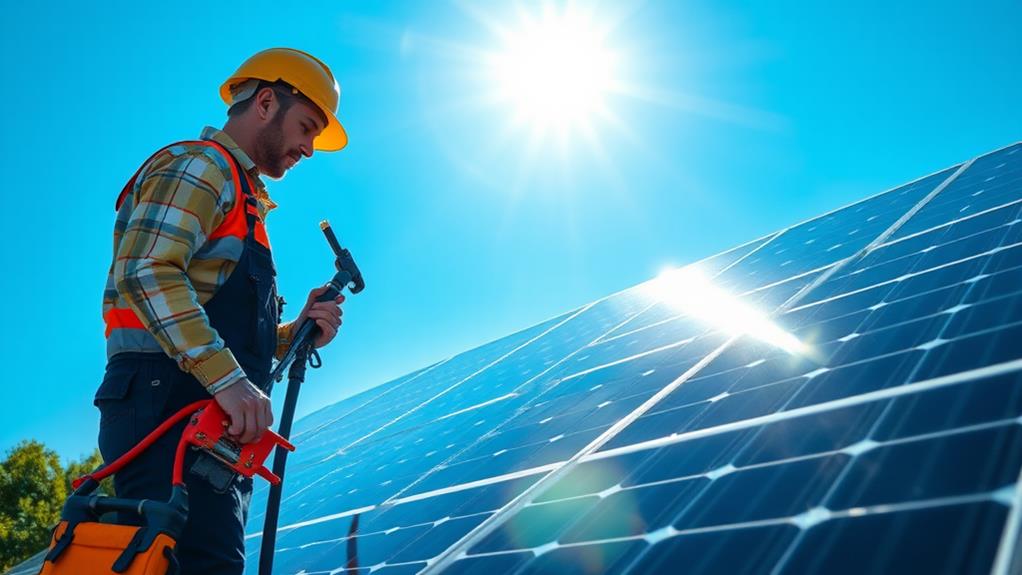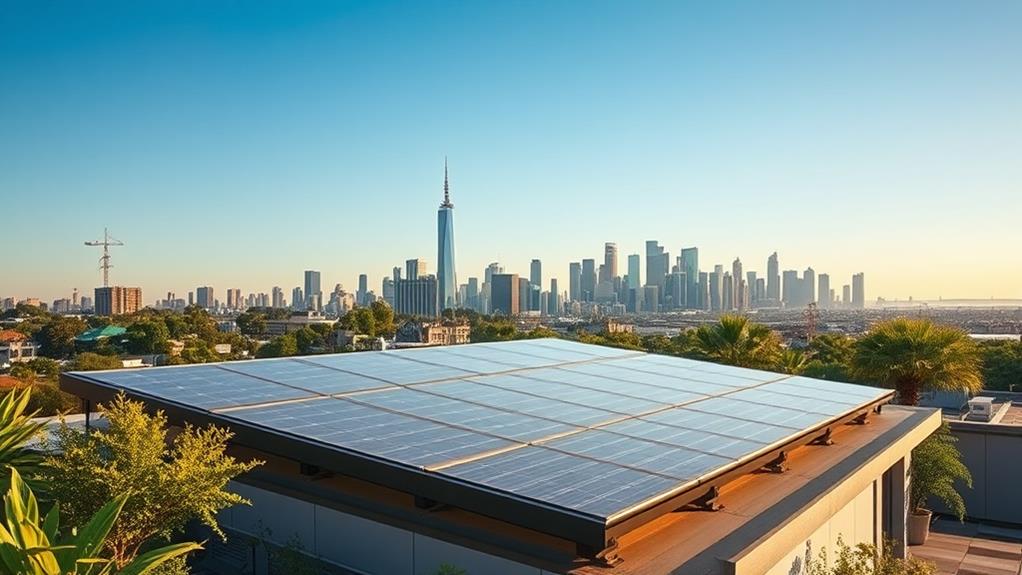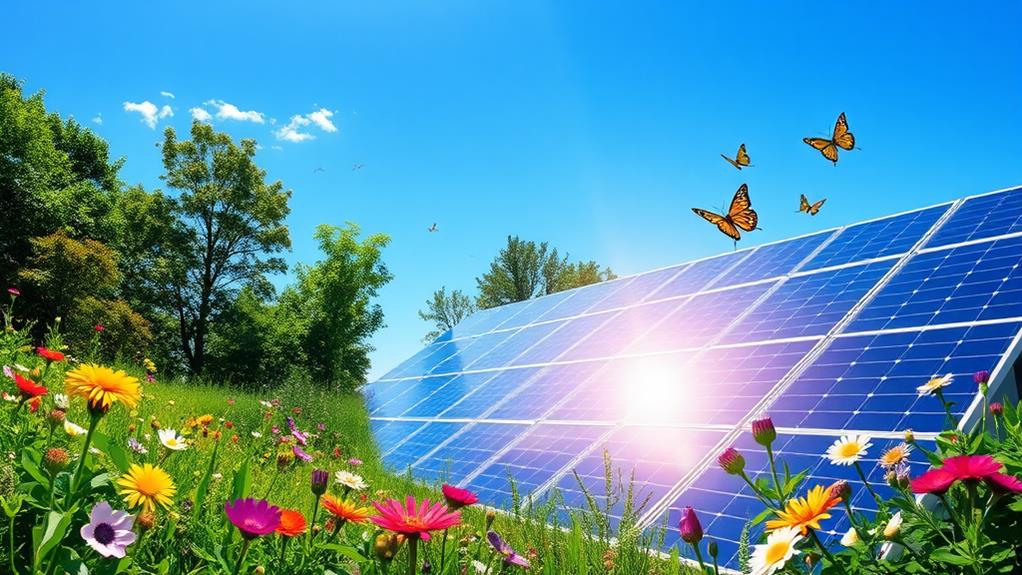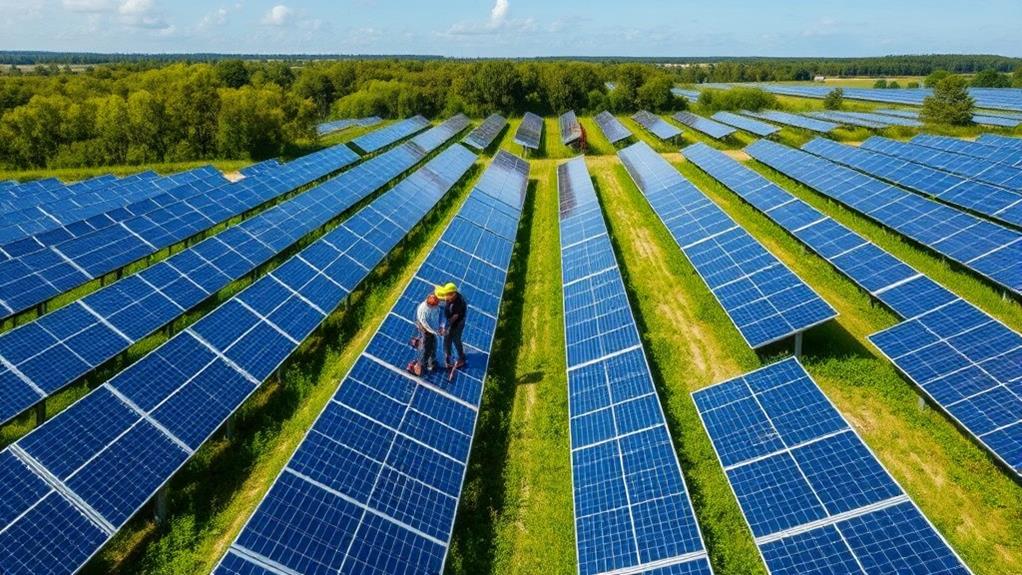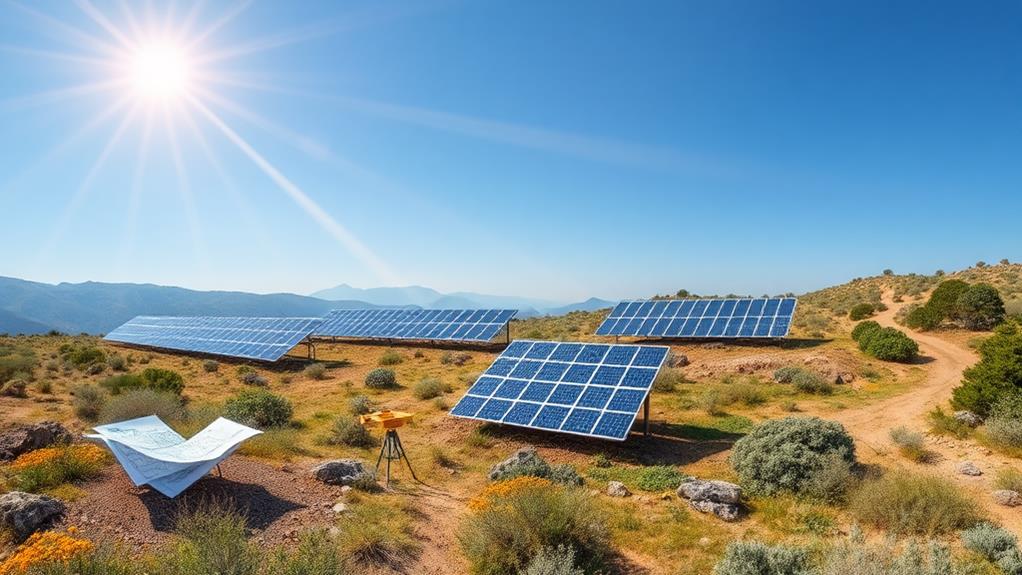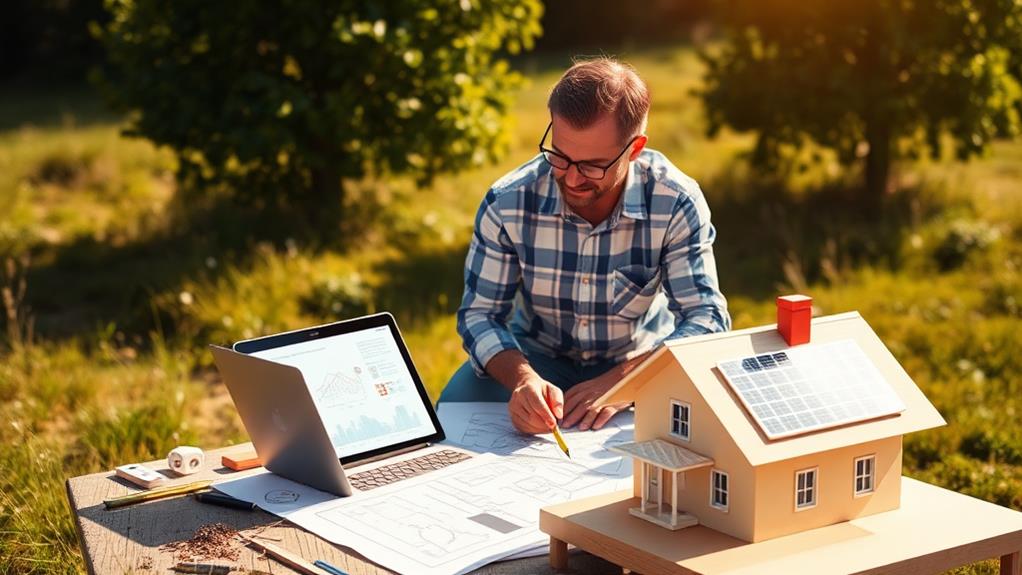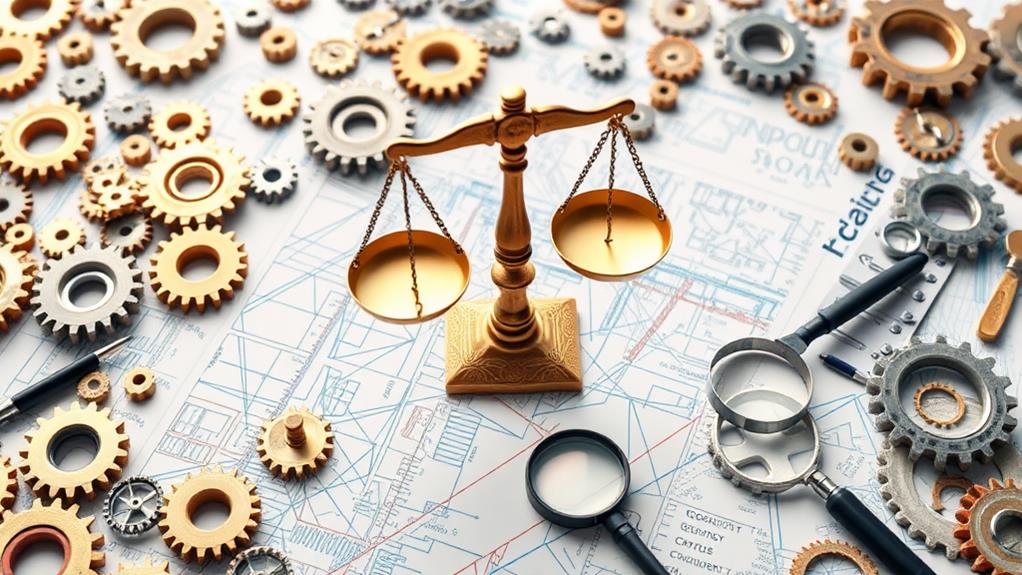Regular preventative maintenance for our solar panels is key to ensuring their optimal performance and longevity. By cleaning them at least twice a year with distilled water and soft brushes, we can prevent dirt build-up that reduces energy output by up to 25%. Remote monitoring systems help us stay ahead of any issues by alerting us to malfunctions before they become costly repairs. Regular inspections, including checking electrical connections and frame stability, maintain efficiency. By understanding these measures, we improve our panels' resilience against weather conditions. Let's optimize our solar investment's performance with these insights.
Key Takeaways
- Regular cleaning twice a year prevents dirt accumulation, maintaining peak solar panel efficiency.
- Remote monitoring systems enable real-time tracking and alerts for timely solar panel maintenance.
- Inspect electrical connections frequently to identify and resolve potential issues early.
- Schedule professional inspections to assess PV cell conditions and ensure system stability.
- Document all maintenance activities to ensure compliance with industry regulations and standards.
Importance of Regular Maintenance
Regular maintenance of solar panels ensures optimal performance and longevity. For a community committed to sustainability, keeping solar panels in excellent condition is essential. A potential 25% reduction in energy production can result from dirt accumulation, so regular cleaning is necessary to maintain peak efficiency. This practice not only protects our investment but also aligns with our shared goal of a greener planet.
Neglect can lead to permanent damage and reduced efficiency, which we all aim to avoid. Regular inspections and cleaning help identify issues early, preventing costly repairs and ensuring our solar systems continue to provide reliable energy savings. Proper care extends the lifespan of our panels and maximises our return on investment, a benefit everyone can appreciate.
Let us adopt the practice of regular maintenance to reduce energy costs over time. Well-maintained solar panels demonstrate our collective commitment to sustainability. Proactive measures preserve the effectiveness of our solar panels and reinforce our community's dedication to responsible energy use.
Monitoring Solar Panel Performance
To ensure our solar panels maintain peak performance, we focus on monitoring their efficiency. Remote monitoring systems enable us to track energy output consistently, identifying any drops that signal potential issues. This fosters a sense of community among us, solar enthusiasts, as we work collectively to keep our panels running efficiently.
Systems like the SolarEdge Monitoring Platform provide real-time data, allowing detailed analysis of both daily and long-term energy production.
With access to this information, we can assess how external factors such as shading or varying weather conditions affect our panels' efficiency. Alerts for panel malfunctions prompt timely maintenance interventions, maintaining our solar systems in peak condition. Imagine the peace of mind knowing our panels are performing optimally without constant physical checks.
Embracing monitoring applications empowers us to be proactive, anticipating maintenance needs for optimal panel efficiency and a longer lifespan for our solar investments. Engaging in this practice not only maintains our solar panels but also reinforces our commitment to sustainable energy solutions, strengthening our community's bond and purpose.
Cleaning Best Practices
Let's focus on how we can keep our solar panels clean to guarantee they perform at their best.
By using pure or distilled water and soft bristle brushes, we can prevent up to a 25% reduction in energy efficiency caused by dirt buildup.
Scheduling a cleaning at least twice a year, or more often in dusty areas, helps maintain optimal output and might require professional help for those hard-to-reach panels.
Optimal Cleaning Techniques
When considering optimal cleaning techniques for solar panels, maintaining efficiency and longevity is paramount. Proper water quality and brush type are crucial to protect our solar investments. Pure or deionised water is essential to prevent mineral deposits from affecting panel performance. Soft bristle brushes or microfibre cloths are highly recommended for gently removing dirt without causing damage. As a community, we value shared knowledge, and these methods support our commitment to sustainable energy.
Safety precautions are equally important. For panels installed at greater heights, extendable handles are invaluable, allowing for safe and thorough cleaning. Professional assistance is sometimes necessary, especially when accessing panels is difficult. Hiring experts guarantees the task is completed safely and efficiently. Our goal is to protect our investments and contribute to a greener future. Utilising these optimal cleaning methods ensures solar panels are maintained effectively and safely, reinforcing our shared values and dedication to renewable energy.
For specific product recommendations, consider Kärcher's range of cleaning tools designed for solar panels, available in South Africa. Their soft bristle brushes and microfibre cloths are well-suited for this purpose.
Effective Cleaning Frequency
Keeping solar panels clean is crucial for maintaining their efficiency. Cleaning should be done at least twice a year to prevent dirt accumulation. In areas with high dust or pollen levels, more frequent cleaning may be necessary. As a community focused on sustainable energy, maximising the efficiency of solar panels is important, and cleanliness plays a key role in this.
Dirt accumulation can reduce energy output by up to 25%. Whether cleaning is done personally or through a professional service, some best practices should be followed. Lukewarm water and soft brushes or cloths should be used to avoid damaging panel surfaces. For those interested in professional cleaning services, they're available at different price points.
Products like the Kärcher K2 Pressure Washer can be effective for personal cleaning, as it provides gentle yet effective cleaning. Additionally, using a microfibre cloth can help ensure a streak-free finish. Prioritising regular maintenance will ensure optimal solar panel performance.
Inspection Guidelines
Let's focus on the key aspects of inspecting our solar panels to keep them running efficiently.
We need to:
- Check the condition of each component.
- Confirm there's no shading or obstruction affecting our panels.
- Inspect all electrical connections for any signs of wear or corrosion.
Component Condition Checks
Conducting regular component condition checks is necessary for maintaining the efficiency and longevity of solar panel systems. As a community dedicated to green energy, we need to ensure our solar panels are in top shape. One important step involves the PV cell inspection. It's crucial to look out for any signs of wear or damage on the cells themselves. Tiny cracks or discolouration can impact performance, so early detection is vital.
Frame maintenance is essential. A sturdy frame holds everything together and protects the cells. Checking for any rust or structural damage is necessary, tightening screws where needed to prevent potential hazards. A secure frame means a secure system.
Inspecting junction boxes is another crucial aspect. Verifying the integrity of electrical connections is important, ensuring everything is tight and corrosion-free. This maintains efficiency and safety. Products like the WAGO 221 Series Compact Splicing Connectors can be very useful for reliable connections.
Checking the functionality of solar charge controllers and inverters is also necessary. They play a vital role in energy conversion and distribution. For instance, the Victron SmartSolar MPPT charge controller offers excellent efficiency and reliability. Addressing these areas ensures solar systems run efficiently and contribute to a sustainable future.
Shading and Exposure Evaluation
Evaluating shading and exposure remains vital for maintaining solar panel efficiency. Understanding how nearby objects or structures might cause shading effects ensures solar energy systems perform optimally. Regular shading analysis identifies obstructions that could hinder energy production, allowing proactive measures to be taken.
Considering not only current shading conditions but also seasonal changes is essential, as these can modify shading patterns and impact panel exposure throughout the year.
Utilising shading analysis tools provides an accurate perspective on how obstructions affect solar panel performance. Such tools facilitate informed decisions regarding adjustments. Altering the panel tilt or repositioning panels can significantly reduce shading effects, maximising sunlight capture. This optimisation boosts energy output and enhances overall solar system efficiency.
Regular evaluations are crucial in this process. Commitment to these practices within the solar community assures efficient systems and the achievement of shared sustainable energy goals.
Electrical Connections Inspection
Ensuring optimal exposure and minimal shading is essential, but so is focusing on electrical connections inspection for solar panel maintenance. Monitoring these connections is crucial to identify potential issues early, which ensures solar systems operate efficiently and safely. Adherence to manufacturer specifications allows for thorough checks, concentrating on tight connections, absence of corrosion, and proper wiring.
Maintaining high energy production requires regular inspections, a proactive step in achieving this goal. To truly be a part of the solar maintenance community, adopting a structured approach is vital. This is similar to the dedicated teams in large-scale solar plants that follow detailed checklists. Such diligence prevents downtime and guarantees maximum system output.
Safety precautions remain paramount during inspections. Always ensure power is off before checking connections. In the event of anomalies, troubleshooting tips often include tightening loose connections or replacing corroded components.
Ignoring these inspections can lead to inefficiencies, reduced energy output, and safety hazards. Together, we can ensure solar panels perform optimally.
Impact of Weather Conditions
Regarding the impact of weather conditions on solar panels, both resilience and vulnerabilities must be considered. Solar energy enthusiasts understand that these panels are designed to withstand harsh conditions, including extreme temperatures and severe weather such as hail or hurricanes, as noted by the Department of Energy. However, high temperatures can slightly reduce efficiency, with a 1% loss for each degree above 77°F (25°C). Monitoring this, especially during heatwaves, is crucial.
In snowy regions, snow maintenance becomes a routine task. Panels covered in snow can't generate electricity effectively, so clearing them is vital for maintaining optimal energy production. This task encourages a sense of community as individuals share tips and tools for efficient snow removal. For instance, the Snow Joe Telescoping Snow Broom is recommended for its effectiveness in reaching and clearing panels.
Elevating panels enhances air circulation, promoting cooling and improving both efficiency and longevity. Extreme weather events, though rare, can pose a risk, making regular maintenance and vigilant monitoring essential. Sharing experiences within the community not only protects investments but also strengthens bonds among members.
Repair and Replacement Tips
Weather conditions present challenges for solar panels. Equally important is the focus on repair and replacement to maintain long-term functionality. As a community committed to sustainable energy, understanding how to address solar panel issues effectively is vital.
A common dilemma is whether to undertake DIY repairs or seek professional assistance. Although tackling problems oneself might be tempting, professional help ensures safety and efficacy. Untrained attempts can cause further damage and void warranties.
For efficiency concerns, contacting the installer is essential, especially if performance issues are under warranty. It's important to check if the warranty covers physical damage, as this often requires different handling.
When deciding between repair and replacement, installer advice is invaluable. They can evaluate the damage and suggest whether repair suffices or replacement is necessary to maintain system efficiency. Trusting professional expertise ensures solar panels continue to meet our community's energy needs safely and effectively.
For instance, if you notice a drop in energy production, consider contacting SunPower for an assessment. They offer robust warranties and can provide insights into potential repairs or replacements. Always opt for qualified professionals such as those from SolarCentury, who are well-versed in the intricacies of solar panel systems.
Cost and Warranty Considerations
When considering the cost and warranty aspects of solar panels, it's important to understand how these elements affect the long-term viability of our investment. Solar panels should provide reliable service for many years, so conducting a comprehensive cost analysis is crucial. Annual maintenance costs are typically around R2,700 to R5,200, which covers essential inspections and cleaning services. However, additional expenses may occur if inspections reveal issues that require specialist attention.
Potential costs should be included when calculating the overall return on investment. Being aware of financial expectations helps ensure confidence in decision-making and fosters a well-informed community of solar panel owners.
Understanding the warranty coverage from manufacturers is equally important. Most warranties cover defects and malfunctions but often exclude regular maintenance costs. Familiarising oneself with the warranty terms allows us to know what repairs and replacements are covered. This knowledge helps protect our investment over the long term, providing peace of mind and collective confidence in our choice.
Staying informed on costs and warranties enables us to maximise the benefits of our solar panel systems.
For example, the SunPower Maxeon 5 panels are known for their robust warranty, covering product defects for up to 25 years. This is an excellent consideration for those seeking long-lasting reliability.
Additionally, the LG NeON R panels offer high efficiency and come with a comprehensive warranty, making them a sound investment for those prioritising performance.
Compliance and Documentation
Ensuring compliance and proper documentation for our solar panel systems is essential to avoid potential issues. Adhering to local and federal regulations isn't just a formality; it's necessary to meet legal obligations and maintain trust within our community. Compliance standards guide us, and it's our responsibility to follow them diligently.
Every maintenance activity must be meticulously documented. This documentation not only satisfies legal compliance standards but also enhances our accountability. Regular audits are a prudent step. They help ensure our panels meet industry regulations and standards, acting as a safety net for our operations and providing reassurance.
Educating our team on compliance protocols is a fundamental aspect of our strategy. Investing in training empowers our staff to uphold the operational integrity of our systems. This proactive approach helps us avoid non-compliance penalties, which could result in significant financial liabilities.
Let us uphold these standards. Doing so protects our investments and strengthens our position as responsible solar panel owners and operators. Together, we meet our legal obligations and foster a community committed to sustainable energy practices.
Conclusion
Maintaining solar panels is key to ensuring they last and work well. Regular checks, thorough cleaning, and careful inspections help keep them efficient. Weather can affect them, so fixing any issues promptly is important. Knowing about costs, warranties, and keeping records is also crucial.
At Deo Solar, we offer a range of products like Rail-Less Solar Brackets, End Spacers, Structural Brackets, Ground Mounted Solar Systems, Corrugated Brackets, and Earthing Plates. Our services include the DeoSizer Tool, Evaluation and Design, Maintenance and Support, and Solar Installations.
If you have any questions about our products or services, please contact us. We are here to help you harness the sun's power effectively.

